Taking a car trip with your cat can be as daunting as it is exciting. Like a delicate flower, your cat requires special care and attention to ensure their comfort and safety during the journey.
Just like you, they need to be prepared for the ride ahead and acclimatized to the new environment. But don’t worry, with a little bit of preparation and patience, you can make this experience enjoyable for both you and your kitty.
Before hitting the road, it’s important to assess your cat’s comfort level when traveling in a car. Some cats may get anxious or stressed out by unfamiliar sights, sounds, or smells while others may enjoy looking out of the window at passing scenery.
Once you understand how your cat feels about car trips, you can take appropriate measures to prepare them for the journey ahead – whether that’s through gradual exposure or finding ways to make them feel more secure in their carrier.
With these steps in mind, let’s dive into some tips on how to take a successful car trip with your beloved feline friend!
Assess Your Cat’s Comfort Level
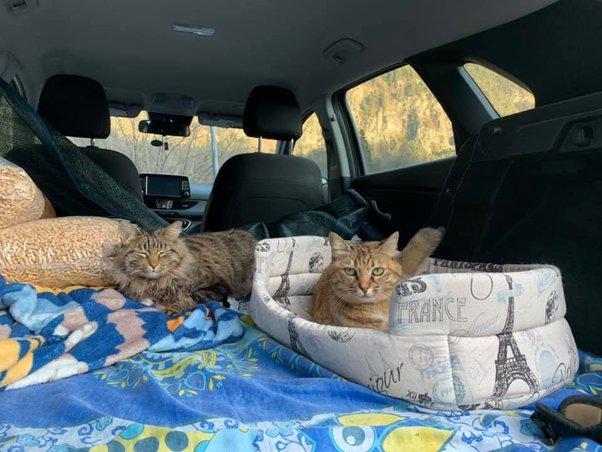
Before you hit the road, take a moment to see if your kitty’s chillin’ or freaking out about the idea of a car ride. Understanding your cat’s anxiety levels is crucial in preparing for a successful trip. Some cats are naturally calm and relaxed while others may get anxious just at the sight of their carrier.
If you notice that your cat gets nervous during car rides, it might be beneficial to talk to your veterinarian about sedative options. There are various medications available that can help alleviate anxiety and make the journey less stressful for both you and your feline friend. However, always consult with a professional before administering any medication.
Once you have assessed your cat’s comfort level, it’s time to prepare the necessary supplies for the trip ahead.
Prepare Necessary Supplies
Make sure you’ve got all the stuff your furry friend needs, like a cozy bed and toys to keep them entertained for hours on end. Pack essentials that will make your cat’s journey comfortable, including a litter box, food and water bowls, treats, and any necessary medications. Don’t forget to bring along their favorite blanket or pillow to provide that extra bit of comfort.
Creating comfort is essential when taking a car trip with your cat. Make sure the carrier is large enough for them to move around comfortably but also secure enough so they won’t escape during the journey. Place a soft mat or towel at the bottom of the carrier to give them something soft to rest on. Additionally, consider bringing some calming sprays or pheromone diffusers to help reduce anxiety during travel.
Now that you’ve packed everything necessary for your cat’s journey and created a comfortable environment in their carrier, it’s time to acclimate them to the car itself. Transitioning into this next step should be done gradually; start by placing your cat in their carrier inside the car while it’s parked in the driveway or garage. Stay with them for short periods at first and then gradually increase their exposure until they’ve become accustomed to being inside the vehicle during motion.
Acclimate Your Cat to the Car
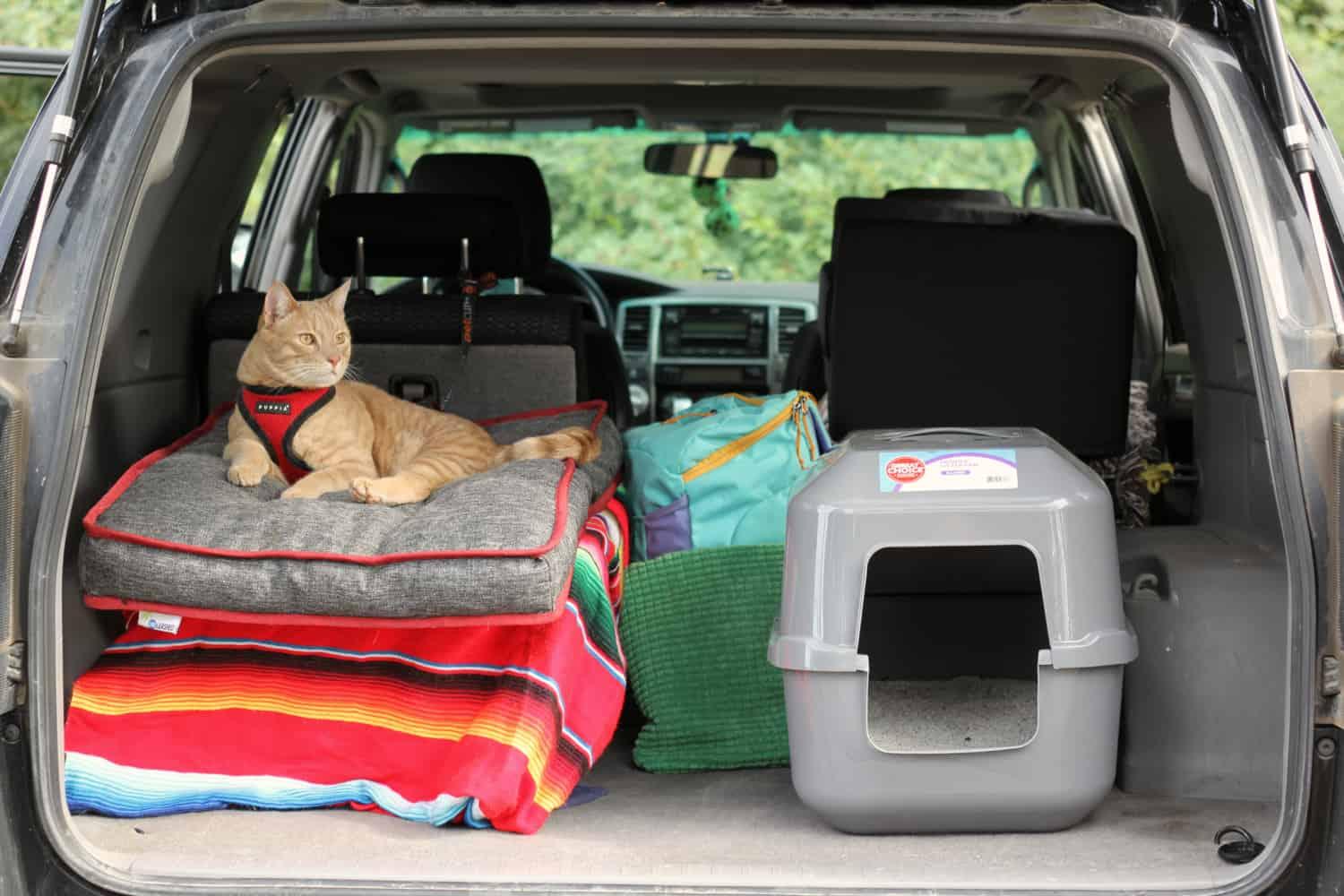
First, get your furry friend used to riding in the car by starting with short trips around the neighborhood. Training techniques, such as positive reinforcement, can help make these initial rides more pleasant for your cat. For example, you may want to try giving your pet treats or toys while they’re in the car to create a positive association with being inside.
It’s also important to note that not all cats enjoy car rides, and some may become anxious or stressed. In these cases, calming methods, such as pheromone sprays or natural remedies like chamomile tea, can be helpful. Additionally, providing a comfortable space for your cat inside the car, such as a cozy bed or blanket, can further reduce stress and anxiety.
Once you’ve acclimated your cat to short rides in the car and have found effective training and calming methods that work for them, it’s time to plan your route for longer trips.
Plan Your Route
Now that your feline friend is comfortable with short car rides, have you considered planning a route for your next adventure together? It’s important to research attractions and activities along the way to ensure both you and your cat have an enjoyable experience.
Additionally, consider rest stops where you can stretch your legs and let your cat out of their carrier for a bit of exercise. To make the trip as smooth as possible, it’s also crucial to check for pet-friendly accommodations along your route. This includes hotels or vacation rentals that allow cats in their rooms.
You don’t want to arrive at your destination only to find out pets aren’t allowed! A little extra planning can save you a lot of hassle down the road. Remember, safety should always be top priority when traveling with your cat.
In the next section, we’ll discuss ways to ensure they’re secure and comfortable throughout the entire journey.
Ensure Your Cat’s Safety
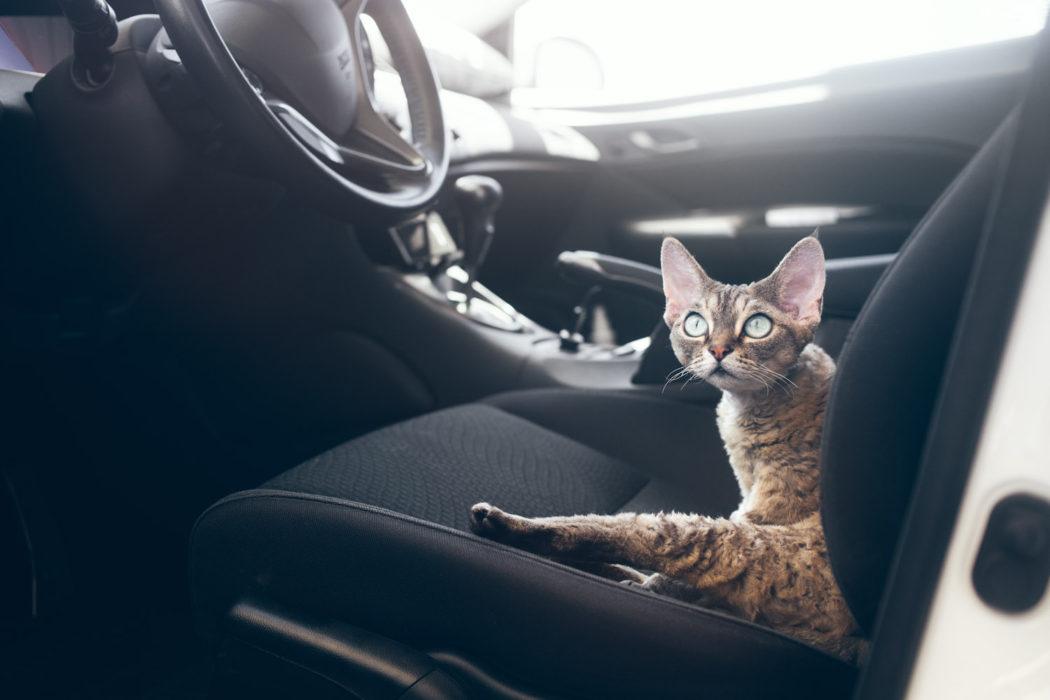
Ensure your furry companion’s safety during travel by using a cat carrier or car harness. These options will allow you to secure your pet in case of sudden stops, turns, or accidents.
If you choose to use a cat carrier, make sure it’s spacious enough for your pet to move around comfortably but not too big that they might get tossed around during the drive. Also, ensure that it has proper ventilation and sturdy locks to prevent escape attempts.
Alternatively, if you prefer using a car harness, make sure it fits snugly but not too tight on your cat’s body. Test it before hitting the road by attaching it to their leash and walking them around the house. This way, they’ll get used to moving with some restraint before being confined in the car seat.
With these precautions in mind, you can now focus on keeping your feline comfortable throughout the trip. Remember, keeping your cat comfortable while traveling is essential for them to enjoy and stay healthy during long trips.
Keep Your Cat Comfortable
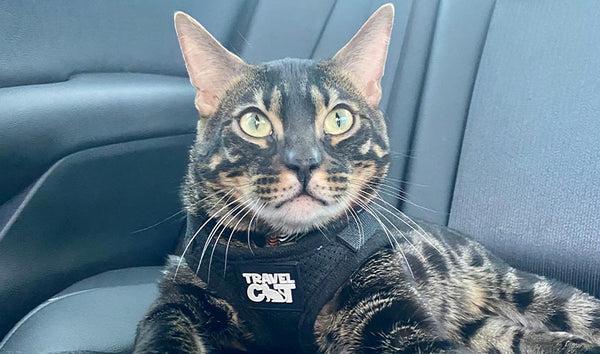
When taking a car trip with your cat, it’s important to keep them comfortable and safe. To ensure their comfort, you’ll want to monitor the temperature and ventilation in the car, especially if it’s hot outside.
Providing adequate food and water is also crucial for keeping your feline friend happy during the journey. Additionally, be sure to allow for stretch and potty breaks so that your cat can move around and relieve themselves as needed.
By paying attention to these key points, you can make the car ride a more enjoyable experience for both you and your furry companion.
Monitor Temperature and Ventilation
Make sure your kitty is comfortable by checking the temperature and ventilation in the car before hitting the road. Cats are sensitive to changes in temperature, and a car can quickly become too hot or too cold for them if you’re not careful. Monitor the temperature inside the vehicle and adjust it accordingly to keep your feline friend happy.
Another important factor to consider is ventilation. Make sure there’s enough fresh air flowing through the car to prevent stuffiness and ensure your cat can breathe easily. Open a window slightly or turn on the air conditioning, but make sure that any drafts aren’t directly blowing on your cat. Also, avoid smoking inside the car as tobacco smoke can be harmful to cats’ delicate respiratory systems.
By monitoring temperature and ventilation, you’ll help ensure a safe and comfortable trip for both you and your furry companion.
Ensuring proper temperature and ventilation is just one aspect of keeping your cat comfortable during a road trip. Providing adequate food and water is another crucial step that shouldn’t be overlooked.
Provide Adequate Food and Water
Providing enough food and water is essential to keep your feline companion well-nourished and hydrated throughout the journey. Here are some tips to make sure your cat stays healthy and happy during your trip:
Stick to their regular feeding routines as much as possible, especially if your cat has a sensitive stomach or dietary restrictions.Make sure there’s always fresh water available for your cat. Bring a spill-proof water bowl that you can refill whenever necessary.Pack some treats or small snacks that your cat enjoys, just in case they get hungry between meals.
Remember, cats have different eating and drinking habits than humans do, so it’s important to pay attention to their needs and preferences while on the road.
Once you’ve ensured that your kitty has enough nourishment for the journey, it’s time to think about allowing for stretch and potty breaks.
It’s crucial for both you and your pet that you take regular breaks during long car trips. This gives you both a chance to stretch your legs, use the restroom facilities (or litter box), and rejuvenate before continuing on with the rest of the journey.
Allow for Stretch and Potty Breaks
Don’t forget to give your furry friend some time to stretch their legs and use the bathroom during your road adventure. Timing considerations are important, so plan ahead for rest stops every few hours. This will not only help keep your cat comfortable, but it will also prevent any accidents in the car.
When stopping for a break, consider providing exercise options for your cat. Bring along a leash and harness so you can take them for a walk or let them explore a safe area outside of the car. You can also bring along toys or treats to encourage playtime and physical activity.
Allowing your cat to move around and burn off energy during these breaks will make them more relaxed and happy when they’re back in the car.
Remember that taking breaks is just one step towards ensuring a successful road trip with your feline companion. Next up, we’ll cover how to enjoy the journey together!
Enjoy the Journey
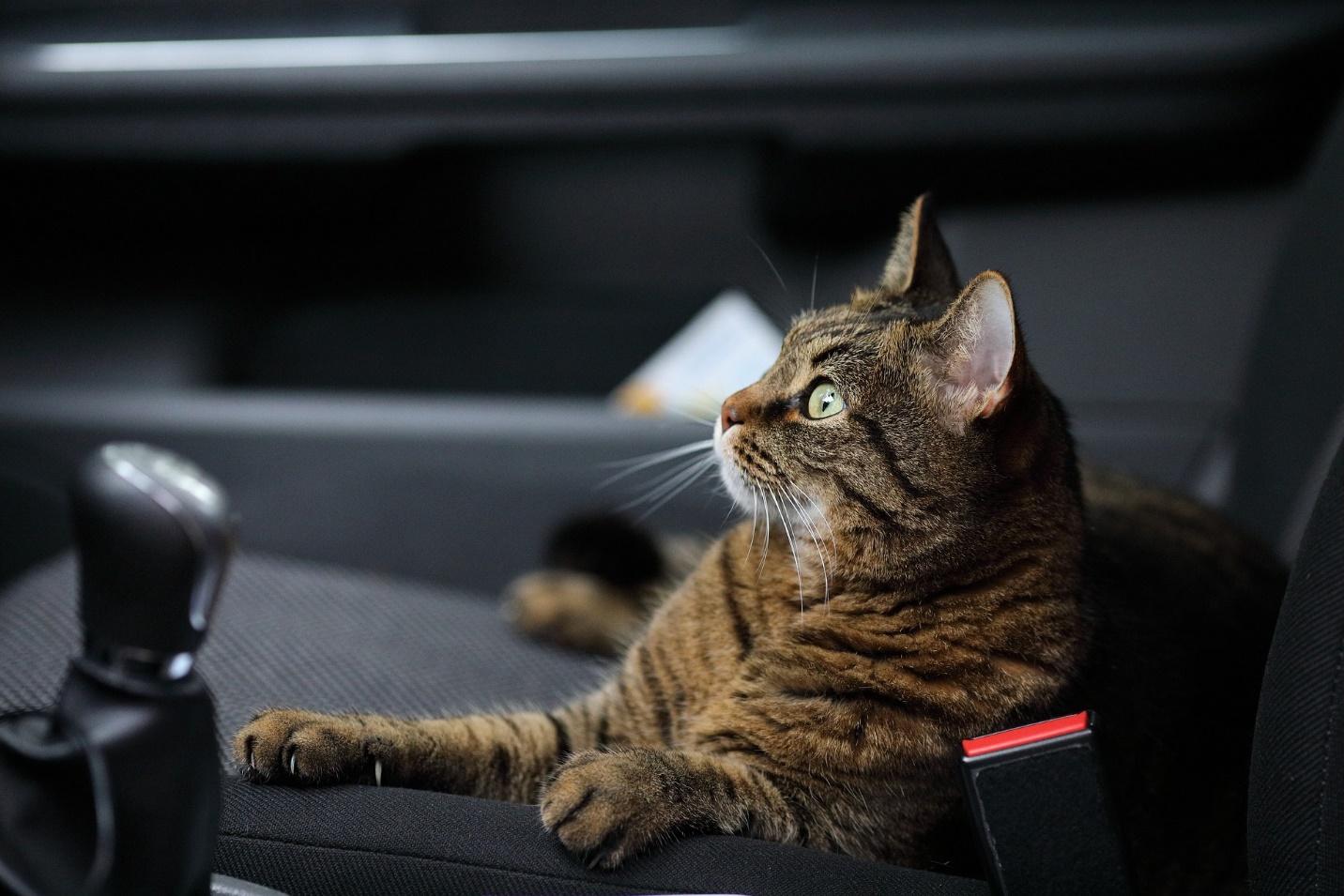
As you hit the open road with your furry feline co-pilot, relish in the freedom of a car trip and savor every moment together. This is a unique opportunity to bond with your cat and create unforgettable memories. While it’s important to take breaks and allow for stretch, don’t forget to enjoy the journey itself.
Here are some tips on how to fully embrace the experience:
Play calming music: Cats love soothing sounds, so why not create a playlist that’ll help them relax during the ride? Soft classical or instrumental music can be very effective in calming down anxious pets.Bring treats and toys: To keep your cat entertained throughout the trip, pack their favorite toys and treats. Interactive toys such as puzzle feeders or laser pointers can provide hours of entertainment.Talk to your cat: Engage in conversation with your feline friend – cats love hearing their owner’s voice! Share stories or simply talk about what you’re seeing outside. Your cat will appreciate the attention.Take scenic routes: If possible, take scenic routes instead of highways. This will give you both an opportunity to see new places and enjoy breathtaking views together.Capture memories: Don’t forget your camera! Take pictures of you and your cat during rest stops or while enjoying scenic views along the way.
Taking a car trip with your cat can be an amazing adventure if done right. Remember that this is also an opportunity for both of you to bond and create lasting memories together. With these tips, you’ll be able to enjoy every moment of it!
Conclusion
Congratulations on successfully taking a car trip with your cat! By following the steps outlined in this article, you were able to assess your cat’s comfort level, prepare necessary supplies, acclimate your cat to the car, plan your route, ensure your cat’s safety, keep them comfortable and ultimately enjoy the journey together.
Did you know that according to a recent survey by AAA and Kurgo Pet Products, 52% of pet owners travel with their pets? That means there are plenty of fellow pet owners out there who understand the joys and challenges of traveling with our four-legged companions.
With proper preparation and care, you can make any car trip with your cat a success. Remember to always prioritize your cat’s well-being during any travel plans. Stay mindful of their comfort levels and be sure to pack all necessary supplies for a smooth journey.
Safe travels!
Read more:
10 Common Reasons Why Cats Stress





